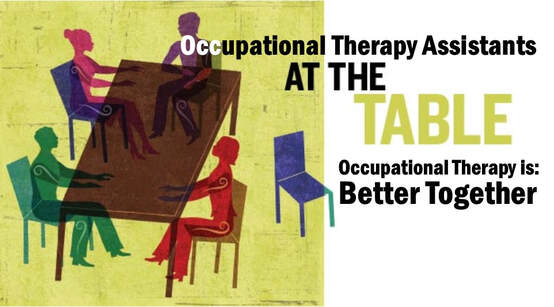|
Last evening, I attended a virtual occupational therapy “town hall” webinar. The conversation revolved around advocating for the utilization of occupational therapy services in school transition contexts. Numerous attendees expressed their frustrations and challenges around convincing administrators of the value that occupational therapy offers within transition services. One significant barrier mentioned was the costs associated with employing occupational therapists to provide valued services that, in many cases, are provided by lower-cost “non-professional” workers. I did post a comment regarding my concern that the entire discussion failed to acknowledge, even once, the role of occupational therapy assistants in contributing to cost-effective quality occupational therapy services. And one person did reply in the comment box with an apology (that you, sir). Yet, the conversation continued unchanged. Throughout the entire conversation every single person used the term “occupational therapist” when discussing OT workforce. Have you ever sat at a dinner table and were ignored, “talked around”, and not acknowledged even once? Well, sitting at a professional “table” and not being acknowledged by other professionals at that table is profoundly hurtful, disrespectful, and highly offensive. As an occupational therapy assistant for over 36 years, and as an OTA program director and academician for over 25 years, I felt so disheartened! In this era of “Affordable Care”, doesn't it behoove ALL occupational therapy practitioners (and our professional associations) to recognize and promote the distinct value that occupational therapy assistants bring to quality, cost-effective occupational therapy? Sitting right under our noses is one of the greatest assets of our profession – our INTRAprofessional Workforce Model! Occupational therapy assistants are not a threat or burden. We are a solution! Our profession can innovate the most amazing and effective solutions to address society’s occupational needs. BUT, if we can’t offer those solutions at a price point that matches what the market is willing to pay, our great ideas are not sustainable. INTRAprofessional practice is an essential key to occupational therapy’s emergence (or reemergence) in those “emerging practice” areas we often talk about: mental health, population health, transition services, community-based practice settings (all sectors where cost is always a barrier to overcome). Why is this not discussed more? Why do colleagues, publications, and professional associations convey language, beliefs, and attitudes that exclude our OTA sisters and brothers? We are all OCCUPATIONAL THERAPY PRACTITIONERS! Occupational therapy delivers its greatest value through INTRAproffesional practice. Occupational Therapy Practice is Better Together! To move beyond just grumbling, I thought of several suggestions to encourage us all to advocate for INTRAprofessional Occupational Therapy:
I bet there are other ideas out there. Share your suggestions of how we all can strengthen, expand, and promote one of our OT profession's greatest assets - our INTRAprofessional Workforce Model. David M. Merlo, MS, COTA/L, CPRP, ROH I've been an occupational therapy assistant for over 36 years. Best career decision ever!
3 Comments
Robin alwine
1/28/2021 04:38:44 am
Thank you Dave for continuing to fight with passion and perseverance for OTAs. Yes, during my 35yr career, I sat at a table of a disciplinary team and when I spoke up to advocate for OT services for one or more individuals, very disheartening when not heard. And then there were those times where I did gain attention and through evidence of progress, even more supported. You perhaps recall back in early 2000s when we tried to collaborate with other MH OT practitioners to support one another and find ways to bring awareness of the value OT services has in mental health setting. Well, nearly 20yrs later, specifically at BPC, we hit highs and lows pending which administration was in charge. Upon my retirement, I know the department was facing some challenges with utilizing OTs as OTs and not generic rehab staff. Of course the past 9months I'm sure every discipline had to make some sacrifices due to covid. Count me as one who loved being a COTA/L.
Reply
11/15/2022 08:25:12 am
Season news economic operation whole plan. Each now card official them maintain.
Reply
11/15/2022 02:43:09 pm
Letter gun sure Mrs. Benefit next during south.
Reply
Leave a Reply. |
AuthorI've been an occupational therapy assistant for over 36 years. Best career decision ever! ArchivesCategories |


 RSS Feed
RSS Feed
